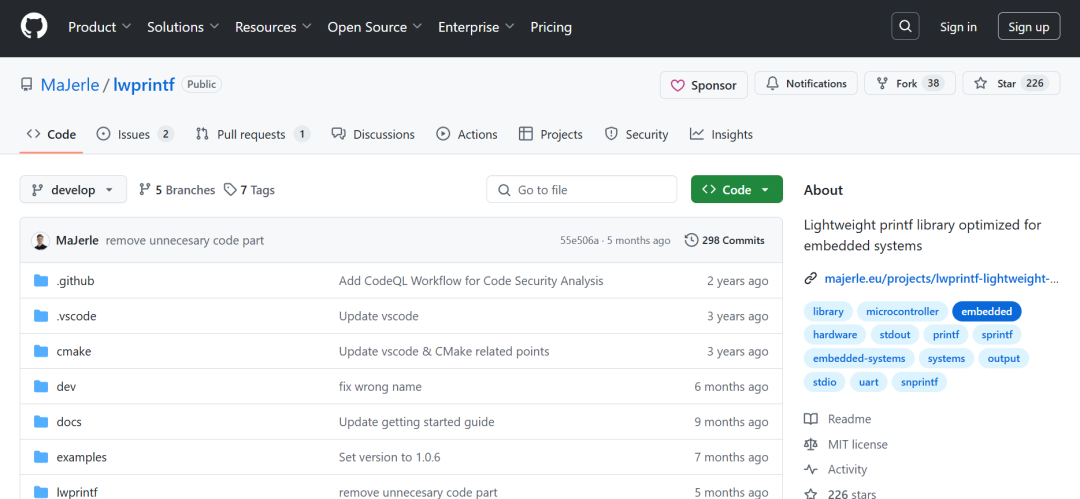In C language development, output management is a crucial part. The traditional
<span>printf</span>function, while powerful, often fails to meet specific needs in terms of memory usage and flexibility, especially in embedded systems. To address these issues,<span>lwprintf</span>was born. This article introduces the background, core features, practical application scenarios of<span>lwprintf</span>, and summarizes the conveniences it offers to developers.

What is LWPrintf?
<span>lwprintf</span> is a lightweight C language print output management library designed to provide a low memory footprint and high-performance output solution. It supports various output formats compatible with the traditional <span>printf</span> function and is designed with the needs of embedded systems in mind. The goal of this library is to provide developers with a simple yet flexible output management tool, especially suitable for scenarios requiring efficiency and resource conservation.
Overview of Core Features
- 1. C11 Standard Compatibility
<span>lwprintf</span>is developed using the C11 standard, ensuring compatibility and support for data types such as<span>size_t</span>and<span>uintmax_t</span>. This allows developers to use more format specifiers, improving code readability and maintainability. - 2. Compatibility with Various Output Functions This library implements output functions compatible with the standard C library’s
<span>printf</span>,<span>vprintf</span>,<span>snprintf</span>,<span>sprintf</span>, and<span>vsnprintf</span>. This design allows developers to retain familiarity with traditional functions while using<span>lwprintf</span>, thus reducing the learning curve. - 3. Low Memory Footprint For embedded systems with significant memory constraints, the low memory footprint advantage of
<span>lwprintf</span>is particularly evident. Compared to other standard output libraries,<span>lwprintf</span>is designed to provide a minimal implementation to fit within environmental resource constraints. - 4. Reentrancy
<span>lwprintf</span>APIs are all reentrant, meaning multiple threads can safely call these functions without causing data conflicts. This is especially suitable for real-time systems or services requiring concurrent output. - 5. Operating System Compatibility
<span>lwprintf</span>is designed with the needs of various operating systems in mind. Users only need to implement a specific output function to support printf-like API calls across different platforms, making it very convenient. - 6. Support for Multiple Output Streams Unlike the traditional
<span>printf</span>function, which only supports a single output stream,<span>lwprintf</span>allows for multiple output streams. This feature enables developers to easily manage outputs from different modules separately, making logging and debugging clearer. - 7. New Format Specifiers
<span>lwprintf</span>adds some additional format specifiers on top of its existing functionality, supporting more complex and diverse output needs. This gives developers greater flexibility in formatted output. - 8. Friendly Open Source License
<span>lwprintf</span>is released under the MIT license, meaning developers can freely use, modify, and distribute the library. This open-source feature encourages community participation and rapid iteration.
Practical Application Scenarios
In embedded systems, memory resources are often scarce, and <span>lwprintf</span> excels in such situations. With its low memory usage feature, developers can meet complex output requirements without burden. Additionally, in multi-threaded applications, the reentrancy of <span>lwprintf</span> eliminates lock contention issues, making development more efficient.
For example, in an embedded system that needs to process a large amount of sensor data, by utilizing <span>lwprintf</span>, we can achieve efficient logging, ensuring the system can output necessary information in real-time without performance bottlenecks caused by output management.
Conclusion
<span>lwprintf</span> is a lightweight and efficient print output management library that provides a highly reliable solution, especially in resource-constrained environments. It is compatible with traditional <span>printf</span> functionality while offering reentrancy and support for multiple output streams, providing significant convenience for multi-threaded development and modular design.
Project Address: https://github.com/MaJerle/lwprintf